Eric Richard is the Founder of the Nomad on FIRE Podcast, where he highlights issues around financial independence within the digital nomad lifestyle. You can subscribe to the podcast here.
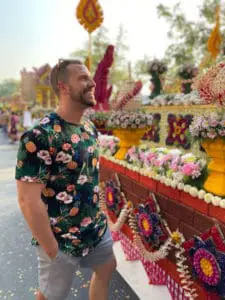
Q: What inspired you to start the Nomad on FIRE Podcast?
A: Pursuing FIRE (Financial Independence Retire Early) and living the digital nomad lifestyle have had tremendous positive benefits for me. Finding out about FIRE led to so many positive life changes for me it’s honestly almost unbelievable looking back.
The podcast is for anyone interested in achieving FIRE, living the digital nomad lifestyle, and learning about living a life with more freedom, excitement, and joy!
I wanted to share my story and the stories of others to inspire and provide people with actionable information so they can do the same.
I also wanted to help foster more synergy between the digital nomad and FIRE communities. There is so much overlap between these communities, but I don’t see many people discussing them together.
Q: What led to your pursuit of this lifestyle?
A: Combining the principles of financial independence with the digital nomad lifestyle was all about living life on my terms with more control over how I spend my time.
Pre-nomad, I was living in Austin and working as an Operations Manager in the warehousing and logistics industry. I had a long commute, an odd work schedule, long hours, and night and weekend shifts.
I craved better work/life balance. Having more freedom over my life and my time — plus the opportunity for adventure — drove me to become a digital nomad.
Now I make money through the savings and investments that I built up while I was working by having a high savings rate and living frugally.
Q: Ok, soooo what is this FIRE thing and how does it combine well with being a digital nomad?
A: If you’ve never heard of FIRE before, you might be thinking, sure if I had millions of dollars I wouldn’t have to work either! But upon closer inspection and really looking at the math, you’ll realize you may not need as much money as you originally thought not to work! Being financially independent either through savings and investments or through passive income cash flow sources such as real estate means that your income covers all of your expenses and you’re not reliant on a job for money. Being financially independent enables some to “retire early” — even in their late 20’s or early 30’s.
You can supercharge the basic principle behind establishing financial independence — earn more and spend less — by living the digital nomad lifestyle. You can use “geographic arbitrage”, a concept popularized by Tim Ferriss in the “4-Hour Workweek” to take advantage of the difference in the value between currencies; for example, earning money in a strong currency like the US dollar (USD) and spending it in a weaker currency like the Thai Baht (THB).
Q: What has your digital nomad journey been like so far? How has Coronavirus impacted you?
A: I started through Remote Year in August 2019 because I hadn’t traveled extensively internationally before. I wanted to have all logistics taken care of for me. I also liked the idea of this amazing community traveling with me.
With Remote Year, I traveled throughout Latin America for four months, visiting Chile, Peru, Colombia, and Mexico. I would definitely recommend it for anyone starting to live the digital nomad lifestyle or who wants a great community. Besides the group you travel with, there are many other ongoing benefits: the Slack community, citizen benefits, and much more. You can read my full review of Remote Year here.
Because of Coronavirus, I’ve had to put a pause on nomading. I decided to return to the U.S. to wait out the pandemic while being with my family. I pre-recorded many episodes of the podcast, so I’m continuing to release those every Tuesday.
Even if continuous travel isn’t possible right now, quarantine is a perfect opportunity to make a plan and start learning new skills to live the digital nomad lifestyle in the future.
Q: What’s it been like creating the podcast?
A: One of the biggest things I’ve learned is the importance of putting yourself out there and the power of connecting with like-minded people. I’ve always consumed a lot of content: blogs, podcasts, and books, but I had never contributed to the discussion.
Having the blog/podcast has been a fantastic way to network with others and be a part of the conversation instead of watching from the sidelines.
I’ve learned a lot about myself — and a lot of technical skills, like recording, audio engineering, interview skills, social media marketing, etc.
It’s actually not all that difficult to start a podcast, it just takes a lot of time and consistency. Like, a lot more time than you think. Once I started recording, I thought I would have the podcast launched within a month, but to do it the way I wanted took me 2.5 months.
The hardest part is definitely growing the audience. I’ve learned so much in terms of marketing and networking but I am very much still a beginner in this regard.
Q: Are you glad you started the podcast? What’s your plan for the future of the show?
A: This season is primarily focused on the digital nomad lifestyle. On Season 2, I’m going to focus more on FIRE. Then in Season 3 and beyond, I’ll dive deeper into topic-specific content like digital nomad travel preparation, travel hacking, beginner investing, finding community while traveling, personal productivity, etc.
By far and away my favorite part of podcasting is talking to inspiring like-minded individuals!
I like to tell people: “imagine there’s a respected figure in a topic you’re interested in. You don’t know this person at all and you just reach out to them out of the blue and say, hey want to chat for an hour?” Normally, they might not respond. But having a podcast gives you a platform to more easily connect with them — I honestly have been blown away by how easy it is to connect with people by having the podcast.
People love sharing their story and I love talking to them about it and sharing awesome insights for the audience! Everyone’s story is unique and inspiring in its own way.
This Q&A has been edited for narrative and context.
The writer was interviewed on Episode 20 of the Nomad on FIRE Podcast, which you can listen to here.


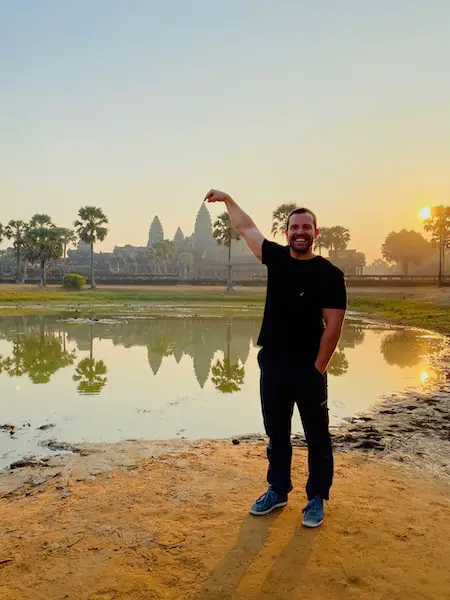

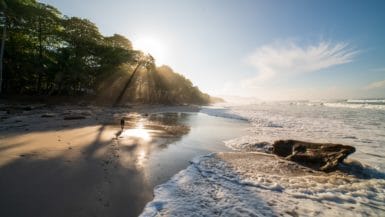
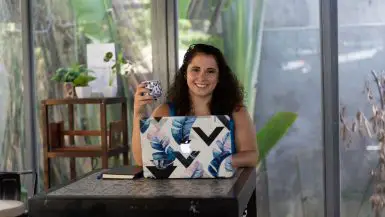
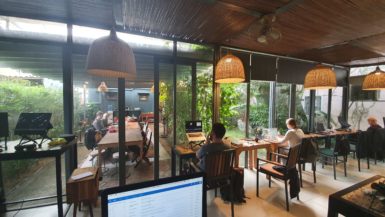
Leave a reply